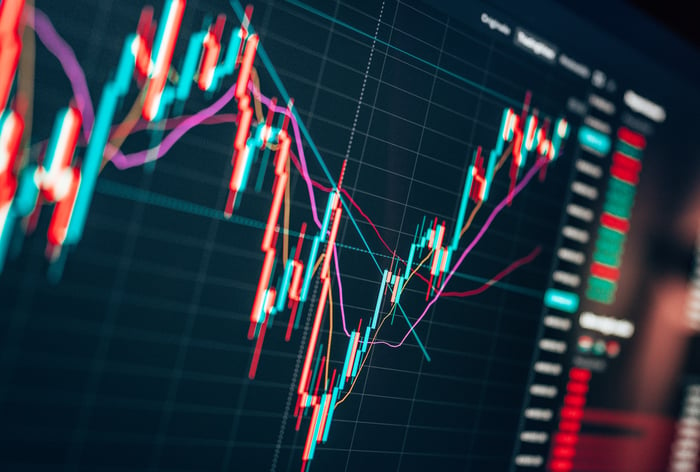Although last year was challenging for most of Wall Street, it was an especially difficult year for growth stocks. When the curtain closed on 2022, both the growth-dependent Nasdaq Composite and the Nasdaq 100 -- an index comprised of the 100 largest nonfinancial companies listed on the Nasdaq exchange -- lost 33% of their value.
But on the bright side, history has consistently shown that bear markets are generational buying opportunities. The thumping that Nasdaq 100 stocks took last year can be a blessing in disguise for opportunistic growth seekers looking to pounce. What follows are three Nasdaq 100 stocks that are surefire buys in 2023.

Image source: Getty Images.
PayPal Holdings
The first phenomenal buy within the Nasdaq 100 is fintech-stock PayPal Holdings (PYPL -1.14%). Shares of the company closed out 2022 down 62% and have shed 77% of their value since peaking in the summer of 2021.
PayPal has faced two issues over the past year. First, historically high inflation isn't a good thing for a consumer-driven business. Higher prices for goods and services can lower the discretionary spending power of low-earning workers.
The other issue for PayPal is that it sported a premium valuation back in 2021. During a bear market, Wall Street and investors return to the safety of traditional fundamental metrics. In other words, there's less willingness to pay a multiple of 50 or more times forward-year earnings. But with PayPal now cheaper than it's ever been as a publicly traded company, the time to pounce has arrived.
Paypal has seen a near-term slowdown in new-account generation, but total payment volume (TPV) traversing its digital peer-to-peer payment networks (PayPal and Venmo), as well as engagement, hasn't slowed considerably. Excluding currency movements, TPV has been growing on a year-over-year basis by a low double-digit percentage. Likewise, the average number of transactions completed by active accounts over the trailing 12 months jumped 25% in the third quarter of 2022, when compared to the end of 2020.
This data tells us two important things about PayPal. For starters, digital sales are still in their infancy and appear to be fully capable of growth during an economic slowdown. And secondly, it signals that PayPal's gross profit is headed higher. Since PayPal is predominantly a fee-based business, higher engagement and more transactions among active accounts should increase the company's gross profit.
Although PayPal continues to innovate and look to the future, it'll also be trimming the fat, so to speak, in 2023. CEO Dan Schulman announced last summer that his company would target at least $1.3 billion in cost savings this year.
Valued at less than 15 times Wall Street's consensus earnings for 2023, PayPal stock may never be this cheap again.
Intuitive Surgical
A second Nasdaq 100 stock that represents a surefire buy in the new year is robotic-assisted surgical-system developer Intuitive Surgical (ISRG -0.50%).
Similar to PayPal, Intuitive Surgical has encountered two clear headwinds over the past couple of years. To begin with, the COVID-19 pandemic has caused physicians and/or patients to push back some optional procedures. These delays reduced instrument and accessory revenue generated from each procedure -- at least temporarily.
The other problem for Intuitive Surgical is its valuation. This company regularly has been valued at a premium price-to-earnings ratio, relative to most healthcare stocks. The good news is that Intuitive Surgical is worth every penny of its premium and has a trio of catalysts in its sails.
To start, it's a healthcare stock, which means it's generally defensive. Even though the pandemic did lead to some optional procedures being delayed, most of the surgical procedures that the da Vinci surgical system is used for are proceeding as planned. Since we can't control when we get sick or what ailment(s) we develop, there tends to be a steady demand for healthcare services, drugs, and devices.
Next, Intuitive Surgical absolutely dominates the robotic-assisted surgical space. In the roughly two decades since it began selling its da Vinci system, it's placed 7,364 of them worldwide. Given the high cost of these systems ($0.5 million to $2.5 million), as well as the training involved for surgeons, the hospitals and surgical centers that purchase them tend to stay clients for a very long time.
The third catalyst for Intuitive Surgical is the steady shift in its revenue mix. The da Vinci surgical system provides only mediocre margins since it's costly and intricate to build. However, selling instruments with each procedure and regularly servicing these systems brings in high-margin revenue.
As time has passed, the pendulum has swung evermore toward these high-margin sales channels. As a result, Intuitive Surgical's earnings growth can outpace its sustained double-digit sales growth.

Image source: Getty Images.
CrowdStrike Holdings
The third Nasdaq 100 stock that's a surefire buy in 2023 is cybersecurity company CrowdStrike Holdings (CRWD 0.13%). Shares of CrowdStrike nearly lost half their value last year and are down 64% since hitting their all-time high in late 2021.
Valuation is arguably the biggest reason CrowdStrike stock has been under pressure for more than a year. At their peak, shares were going for well over 100 times forward-year earnings. Rarely are investors going to support such a premium during a bear market.
The other concern for CrowdStrike is the growing likelihood that the U.S. will dip into a recession. With the Federal Reserve aggressively raising interest rates and the Treasury rate yield curve inverting, the recipe is there for the U.S. economy to shift into reverse. There's skepticism that this could slow CrowdStrike's sales growth. But CrowdStrike wouldn't make this list if it didn't offer clear-cut competitive advantages.
For one thing, the cybersecurity industry is incredibly defensive. With most businesses moving their data online and into the cloud in the wake of the pandemic, third-party cybersecurity solution providers have taken on an increasingly bigger role in protecting enterprise and consumer data. No matter how well or poorly the U.S. economy and stock market perform, hackers and robots don't take time off from trying to steal sensitive information.
What makes CrowdStrike so special is its cloud-native end-user security platform known as Falcon. This platform handles everything from identity protection to cloud security with the help of artificial intelligence (AI) and machine learning. By overseeing trillions (yes, with a t) of events weekly, Falcon becomes more efficient at recognizing and responding to potential threats over time.
The proof is in the pudding that Falcon is resonating with its subscribers. In less than six years, CrowdStrike's subscriber count has grown from 450 to north of 21,100, and its gross retention rate has jumped from less than 94% to over 98%.
Most impressively, the number of clients that have purchased at least five cloud-module subscriptions has grown to 60%, as of the most recent quarter. Less than six years ago, only a single-digit percentage of its clients had bought at least four cloud-module subscriptions.
These add-on sales have lifted CrowdStrike's adjusted subscription gross margin to almost 80%. If the company can sustain or modestly grow its adjusted subscription gross margin, it should have no trouble supporting a premium valuation.





